Bird flu, measles top 2025 concerns for Canada's chief public health officer
As we enter 2025, Dr. Theresa Tam has her eye on H5N1 bird flu, an emerging virus that had its first human case in Canada this year.
At the same time, Canada's chief public health officer is closely monitoring measles—a virus that was eliminated in this country more than two decades ago, but is making an accelerated resurgence.
H5N1, a strain of highly pathogenic avian influenza viruses carried by wild birds, has been on the rise globally. It has decimated poultry farms in Canada and infected dairy cattle herds in several states south of the border.
But its spread to humans is especially worrisome.
"What I am particularly concerned about is that this virus has demonstrated the capability of a whole range of clinical outcomes, from asymptomatic infection ... all the way to rare cases of severe illness," said Tam in a year-end interview on Dec. 18.
"So it's something that we really need to be very vigilant about.”
Canada's only confirmed H5N1 patient—a teen in B.C.—was severely ill and hospitalized in November. Health officials there have still not been able to determine how the teen got infected.
READ: Avian flu detected in additional Abbotsford and Chilliwack flocks: CFIA
No one else got sick with the virus, said Tam, which is encouraging because it suggests there hasn't yet been any human-to-human transmission.
Although the risk to the general public is still considered low, there have been at least 65 confirmed human cases in the U.S. in 2024, mostly among farm workers. Most cases have been mild, with conjunctivitis, or pink-eye, among the symptoms.
But on the same day as The Canadian Press interview with Tam, health officials announced the first case of severe illness in the U.S.—a person over 65 in Louisiana who had been in contact with sick birds in a backyard flock.
”(That) tells me that we need to do significant outreach not just to commercial poultry farms, for instance, but there are people who keep backyard chickens or other birds," Tam said.
"Those backyard birds are exposed to wild birds that are the carriers of this H5N1 virus."
Education about wearing personal protective equipment and taking biosecurity measures is important for anyone keeping birds in Canada—not just commercial farms, she said.
Tam says it's also time for more bird flu awareness among the general public.
“We need to handle any sick or dead birds (or) other animals with a great deal of care," she said.
"If in doubt, don't touch and call up your local veterinarian or public health authority in order to know what to do if you do have dead birds or animals in your garden or backyard.”
But it's not just new illnesses that Tam is worried about.
"There's an increase in circulation of a number of vaccine-preventable diseases like measles, like pertussis (whooping cough)," she said.
READ: Canada aims to protect cattle industry as U.S. avian flu outbreak spreads
Tam said there have been close to 170 measles cases in Canada in 2024, compared to 59 cases last year.
Many cases are related to a large outbreak that started in the fall in New Brunswick and has since spread through travel to people in Ontario, she said.
The majority of people affected had not been vaccinated.
Children can be especially hard-hit by measles, she said. One child under five years old died in Ontario this year, something "we have not seen for a very long time," Tam said.
"These are just really incredible reminders of why we need to keep up with our vaccinations.”
Most parents haven't seen measles and may not realize the gravity of the illness because "very effective vaccines" have protected children from getting it for decades, Tam said.
Measles was declared eliminated in Canada in 1998. Cases since then can generally be traced back to someone who travelled and brought in the virus from another country—then it spreads to those who aren't immunized.
"This is such an infectious virus, it will seek out all the unvaccinated people," Tam said.
"It is a serious illness. Kids get very sick and sometimes they have to be hospitalized."
Whooping cough is also making a comeback after being controlled by vaccination for years, Tam said.
It can make young children very ill and health-care professionals often call it the "the 100 day cough."
Tam said one of the factors likely driving the resurgence of measles and whooping cough is the disruption to children's routine immunizations during the COVID-19 pandemic. Despite "catch-up" programs, "we're still not back at the pre-pandemic levels of vaccine coverage.”
When it comes to COVID-19 itself, Tam said the virus continues to evolve and spread, but has not established a predictable pattern like seasonal flu or respiratory syncytial virus (RSV).
Flu is starting to rise and RSV activity is high, but the number of COVID-19 infections have come down since the fall, Tam said.
”We're not seeing them sort of come together in one big 'tripledemic' like we did two years ago.”
Still, a winter bump in COVID-19 is possible, and people who are older and who have underlying chronic health conditions are still especially vulnerable to serious illness, Tam said.
Handwashing, wearing masks and staying home when sick—as well as getting updated vaccinations—continue to serve as "layers of protection" against circulating viruses, she said.
With files from The Associated Press



